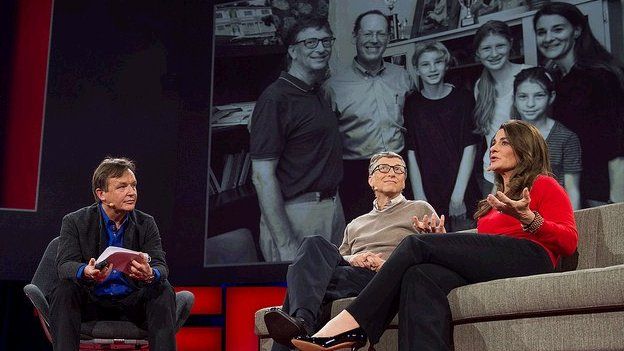Ted 2014: Gates talks up joys of philanthropy
- Published

Sitting on a sofa on the Ted stage in Vancouver, Bill Gates looks at one with the world.
Perhaps it is because these days he is talking philanthropy rather than business - the work he does at the Gates Foundation being far easier to defend perhaps than some of things that happened at Microsoft.
Maybe it is also because his wife, Melinda, is sitting next to him, doing most of the talking.
She will probably be pleased to hear, after 20 years of marriage, he regards her as his main partner now.
He reveals that it was a walk on the beach with his wife that made him decide to step aside from Microsoft in 2008 and concentrate on the work of the foundation.
"We have a good partnership," he tells curator Chris Anderson at the Ted (Technology, Entertainment and Design) conference.
"I used to have that with Paul Allen, then with Steve Ballmer and now with Melinda," he says.
The partnership works, reveals Mrs Gates, because they come at the problems of poverty and disease from different angles.
"Bill looks at big data whereas I look at things with intuition," she says.
"We need to take the data and meet with people on the ground to see how it can be delivered. That piece is every bit as important."
Special privileges
The pair are being interviewed as part of the 30th anniversary of Ted, a conference which has become synonymous with championing causes that fight global injustice.
The Gates Foundation recently received a huge boost when it was revealed that billionaire Warren Buffett was to give a large proportion of his own fortune to it.
Mr Gates says he was "stunned" by his friend's decision.
"He is big on delegation," he jokes. "If he's got somebody who's doing something well and is willing to do it at no charge, maybe that's OK."
The Gates Foundation has two main aims - to improve education in America and to fight communicable diseases in Africa.
There have been a few failures along the way, admits Mr Gates.
"We were very naive about a drug that turned out would require an injection every day for 10 days. We wasted five years and $60m on a path with very modest benefits," he tells the Ted crowd.
And Mrs Gates says there have been mistakes in their work in education, too.
"We thought small schools were the answer but it turns out that it doesn't really matter what size the class is, you need a great teacher in front of the classroom," she says.
The Gateses can afford to send their own children to the very best schools but, reveals Mr Gates, there will be no special privileges for them.
"We have to strike a balance between the freedom to do anything with not having money showered on them so that they do nothing," he says.
Donating fortune
Even with his fortune giveaways, he can still afford to make billionaires of all three, says Mr Anderson. So will he?
"They won't get anything like that," says Mr Gates. "They need a sense that their own work is meaningful."
Notoriously guarded about their children's privacy, the Gateses show off a rare family photo and talk about how their children are as committed to the foundation as they are.
Mrs Gates reveals she and her eldest daughter have recently spent time living with a family in a remote African village.
With his newly restored status as the world's richest man, Mr Gates has a lot to be happy about - and he seems most pleased about the fact that he is giving 95% of his fortune away.
With Warren Buffet he has set up Giving Pledge to persuade other billionaires to do the same, and so far they have convinced 120 people to take the pledge.
At Ted, Mr Gates was invited to make a pitch for more among an audience almost certain to have more than its fair share of the super-rich.
"It is the most fulfilling thing we've ever done," says Mr Gates simply.
When Microsoft announced its new chairman, Satya Nadella, in February, it was also revealed that Mr Gates was to take a more hands-on role in the company as a technology adviser.
He wasn't asked how that would pan out during the Ted interview, but it is hard to imagine him giving up much of his role in the foundation he clearly loves.
His head may still favour coding and business first but his heart is clearly fixed on his future as a philanthropist.
- Published3 March 2014
- Published5 February 2014
- Published17 March 2014